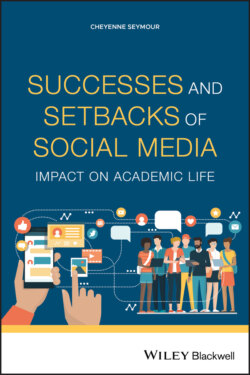Читать книгу Successes and Setbacks of Social Media - Группа авторов - Страница 11
Social Media and Student Engagement
ОглавлениеIt is likely that most students can recall, at one point in time, sitting in a class and hearing only the voice of the instructor or perhaps the proverbial crickets when a question was posed to those in the room. To combat this, social media is being used to promote engagement in courses. There is a myriad of reasons why platforms are being used to connect students to course content and one another. Public university students who used Facebook for class-related discussions expressed an appreciation of sharing content in a virtual space because it is familiar, visually appealing, and easy to use (Hurt et al. 2012).
Embedding social media in courses can aid in the creation of community. Just as students are exploring new subject matter in their classes, they are meeting new people on campus. For some, it can take time to feel comfortable asking questions and sharing insights with those inside the classroom walls. Studies show that when undergraduates use social media to connect, they begin to relate to their educational peers. Sheeran and Cummings (2018) found that “students with either an official or unofficial Facebook group in at least one of their courses did have an increased sense of belonging.” Undergraduates enrolled in an introductory-level course reported experiencing closer connections with classmates and feeling like a valued addition to the class, as a result of their Facebook discussions (Hurt et al. 2012).
The frequency of engagement on social media is likely to increase when the professor is involved in the exchanging of posts. In a study examining the required and voluntary use of Twitter in class, in conjunction with the regular and infrequent participation of faculty on the social site, it was found that parameters set for usage affected both engagement and grades; as noted by the researchers, “faculty engagement on the platform is essential in order to impact student outcomes” (Junco et al. 2013). Just as the instructor is essential in the physical classroom to facilitate learning, they are also important in digital learning spaces.
Many students enjoy social media and the memes, photos, videos, and more that it has to offer. Researchers have found that coupling social sites with higher education can lead to positive feelings. Students in an undergraduate calculus class, who participated in a Facebook group focused only on disseminating instruction, reported feeling not only more engaged in the course, but more satisfied with it as well (Gregory et al. 2014). Using social media to supplement collegiate courses can be a way to increase the joy of learning.
